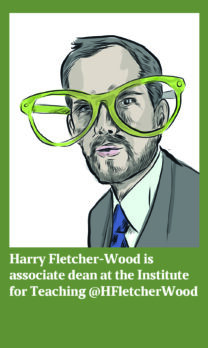Reviewer Harry Fletcher-Wood shares his top education blogs this week
The problem with education in England
@mathsjem
“Did you know England tops the world’s league table in rote memorisation?” Jo Morgan begins. “This is, most certainly and without equivocation, a bad thing.” It’s a bad thing, we are told, because it resembles a factory model reminiscent of the Victorians, overlooking the achievements of Finland and the importance of deep learning.
Morgan proceeds to break down each argument, highlighting the breadth of Victorian education, the problems with copying other countries, and the depth of understanding teachers are pursuing: “Don’t believe the people who tell you we are ‘forcing’ kids to memorise instead of teaching things properly. Those with an ideology to push will tell you that we are forcing children to learn things like times tables at the expense of any kind of proper understanding. This is patently untrue.”
She argues that primary school pupils are learning times tables as “part of the bigger picture of learning mathematics. They learn how multiplication and division are related, how multiplication can be expressed as an array, how it is both repeated addition and stretching, how it underpins proportional reasoning.” Certainly, we can do better, but while there are many problems in English education, “these problems don’t lie with teachers forcing students to memorise disconnected facts”.
AfL in Science: Dylan Wiliam responds
@dylanwiliam
In a previous blogs review, I recommended the AfL in Science symposium organised by Adam Boxer, in which a number of science teachers reflected on what formative assessment looked like for them in science teaching. In this post, Dylan Wiliam concludes the series and responds to their points.
He reflects on whether formative assessment is generic or subject-specific, “one of the most frustrating debates that I have witnessed over the past 20 years”, on how formative assessment interacts with different approaches to curriculum, pedagogy and depth of learning, and on who is responsible for the social consequences of tests.
He concludes with an analogy to physicists, who recognise that “understanding the behaviour of electrons required understanding that sometimes treating them as particles provided the greatest insights, whereas in other situations, it was useful to treat them as waves. In the same way, whether we treat formative assessment as domain-specific or domain-general depends on whatever is most appropriate for the situation at hand. As George EP Box, the British statistician, said, ‘all models are wrong but some are useful’.” A worthy conclusion to a thought-provoking series.
Using cognitive load theory to improve slideshow presentations
@atharby
Andy Tharby notes that “the slideshow has become so ubiquitous that it has become synonymous with the lesson itself”, but that “the jury is still out as to whether teaching from a slideshow supports or hampers learning”. He suggests using cognitive-load theory to design slideshows which don’t overwhelm students’ working memory: remaining mindful of intrinsic cognitive load, reducing extraneous and increasing germane load.
He offers a number of concrete strategies to achieve this, including minimising slide content, integrating labels with diagrams, removing distracting images and using physical proximity to show relatedness. Andy combines practical guidance with the evidence to very useful effect.
Learning styles – the fad which will not die
@oldandrewuk
Learning styles made an unwelcome return to fame recently after a Teacher Tapp survey revealed that a majority of the 2,000+ teachers surveyed believe they exist. In this post, Andrew Old reviews four common responses from teachers, and why they are problematic for the profession.
For example, that teachers mean “preferences” when they say “styles”, the claim that while “old VAK learning styles may have been discredited, there’s no problem accepting that there may be some new theory of learning styles out there that it’s okay to believe”, or that it just means that children are different. Old concludes by noting an incongruity of his own teacher training: “I had to sit a skills test assessing that I knew how a spreadsheet works, but nobody ever checked I knew how learning worked.”













Your thoughts